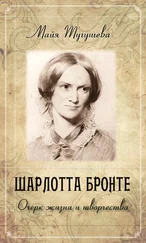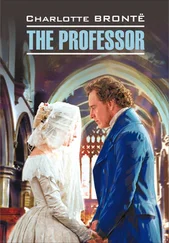Шарлотта Бронте - The Professor
Здесь есть возможность читать онлайн «Шарлотта Бронте - The Professor» — ознакомительный отрывок электронной книги совершенно бесплатно, а после прочтения отрывка купить полную версию. В некоторых случаях можно слушать аудио, скачать через торрент в формате fb2 и присутствует краткое содержание. Год выпуска: 2014, Издательство: epubBooks Classics, Жанр: Классическая проза, на английском языке. Описание произведения, (предисловие) а так же отзывы посетителей доступны на портале библиотеки ЛибКат.
- Название:The Professor
- Автор:
- Издательство:epubBooks Classics
- Жанр:
- Год:2014
- ISBN:нет данных
- Рейтинг книги:3 / 5. Голосов: 1
-
Избранное:Добавить в избранное
- Отзывы:
-
Ваша оценка:
- 60
- 1
- 2
- 3
- 4
- 5
The Professor: краткое содержание, описание и аннотация
Предлагаем к чтению аннотацию, описание, краткое содержание или предисловие (зависит от того, что написал сам автор книги «The Professor»). Если вы не нашли необходимую информацию о книге — напишите в комментариях, мы постараемся отыскать её.
The Professor — читать онлайн ознакомительный отрывок
Ниже представлен текст книги, разбитый по страницам. Система сохранения места последней прочитанной страницы, позволяет с удобством читать онлайн бесплатно книгу «The Professor», без необходимости каждый раз заново искать на чём Вы остановились. Поставьте закладку, и сможете в любой момент перейти на страницу, на которой закончили чтение.
Интервал:
Закладка:
"Were you satisfied with your pupils, or did any circumstance in their conduct give you cause for complaint? Conceal nothing from me, repose in me entire confidence."
Happily, I felt in myself complete power to manage my pupils without aid; the enchantment, the golden haze which had dazzled my perspicuity at first, had been a good deal dissipated. I cannot say I was chagrined or downcast by the contrast which the reality of a pensionnat de demoiselles presented to my vague ideal of the same community; I was only enlightened and amused; consequently, I felt in no disposition to complain to Mdlle. Reuter, and I received her considerate invitation to confidence with a smile.
"A thousand thanks, mademoiselle, all has gone very smoothly."
She looked more than doubtful.
"Et les trois demoiselles du premier banc?" said she.
"Ah! tout va au mieux!" was my answer, and Mdlle. Reuter ceased to question me; but her eye—not large, not brilliant, not melting, or kindling, but astute, penetrating, practical, showed she was even with me; it let out a momentary gleam, which said plainly, "Be as close as you like, I am not dependent on your candour; what you would conceal I already know."
By a transition so quiet as to be scarcely perceptible, the directress's manner changed; the anxious business–air passed from her face, and she began chatting about the weather and the town, and asking in neighbourly wise after M. and Madame Pelet. I answered all her little questions; she prolonged her talk, I went on following its many little windings; she sat so long, said so much, varied so often the topics of discourse, that it was not difficult to perceive she had a particular aim in thus detaining me. Her mere words could have afforded no clue to this aim, but her countenance aided; while her lips uttered only affable commonplaces, her eyes reverted continually to my face. Her glances were not given in full, but out of the corners, so quietly, so stealthily, yet I think I lost not one. I watched her as keenly as she watched me; I perceived soon that she was feeling after my real character; she was searching for salient points, and weak points, and eccentric points; she was applying now this test, now that, hoping in the end to find some chink, some niche, where she could put in her little firm foot and stand upon my neck—mistress of my nature. Do not mistake me, reader, it was no amorous influence she wished to gain—at that time it was only the power of the politician to which she aspired; I was now installed as a professor in her establishment, and she wanted to know where her mind was superior to mine—by what feeling or opinion she could lead me.
I enjoyed the game much, and did not hasten its conclusion; sometimes I gave her hopes, beginning a sentence rather weakly, when her shrewd eye would light up—she thought she had me; having led her a little way, I delighted to turn round and finish with sound, hard sense, whereat her countenance would fall. At last a servant entered to announce dinner; the conflict being thus necessarily terminated, we parted without having gained any advantage on either side: Mdlle. Reuter had not even given me an opportunity of attacking her with feeling, and I had managed to baffle her little schemes of craft. It was a regular drawn battle. I again held out my hand when I left the room, she gave me hers; it was a small and white hand, but how cool! I met her eye too in full—obliging her to give me a straightforward look; this last test went against me: it left her as it found her—moderate, temperate, tranquil; me it disappointed.
"I am growing wiser," thought I, as I walked back to M. Pelet's. "Look at this little woman; is she like the women of novelists and romancers? To read of female character as depicted in Poetry and Fiction, one would think it was made up of sentiment, either for good or bad—here is a specimen, and a most sensible and respectable specimen, too, whose staple ingredient is abstract reason. No Talleyrand was ever more passionless than Zoraide Reuter!" So I thought then; I found afterwards that blunt susceptibilities are very consistent with strong propensities.
Chapter XI.
I HAD indeed had a very long talk with the crafty little politician, and on regaining my quarters, I found that dinner was half over. To be late at meals was against a standing rule of the establishment, and had it been one of the Flemish ushers who thus entered after the removal of the soup and the commencement of the first course, M. Pelet would probably have greeted him with a public rebuke, and would certainly have mulcted him both of soup and fish; as it was, that polite though partial gentleman only shook his head, and as I took my place, unrolled my napkin, and said my heretical grace to myself, he civilly despatched a servant to the kitchen, to bring me a plate of "puree aux carottes" (for this was a maigre–day), and before sending away the first course, reserved for me a portion of the stock–fish of which it consisted. Dinner being over, the boys rushed out for their evening play; Kint and Vandam (the two ushers) of course followed them. Poor fellows! if they had not looked so very heavy, so very soulless, so very indifferent to all things in heaven above or in the earth beneath, I could have pitied them greatly for the obligation they were under to trail after those rough lads everywhere and at all times; even as it was, I felt disposed to scout myself as a privileged prig when I turned to ascend to my chamber, sure to find there, if not enjoyment, at least liberty; but this evening (as had often happened before) I was to be still farther distinguished.
"Eh bien, mauvais sujet!" said the voice of M. Pelet behind me, as I set my foot on the first step of the stair, "ou allez–vous? Venez a la salle–a–manger, que je vous gronde un peu."
"I beg pardon, monsieur," said I, as I followed him to his private sitting–room, "for having returned so late—it was not my fault."
"That is just what I want to know," rejoined M. Pelet, as he ushered me into the comfortable parlour with a good wood–fire—for the stove had now been removed for the season. Having rung the bell he ordered "Coffee for two," and presently he and I were seated, almost in English comfort, one on each side of the hearth, a little round table between us, with a coffee–pot, a sugar–basin, and two large white china cups. While M. Pelet employed himself in choosing a cigar from a box, my thoughts reverted to the two outcast ushers, whose voices I could hear even now crying hoarsely for order in the playground.
"C'est une grande responsabilite, que la surveillance," observed I.
"Plait–il?" dit M. Pelet.
I remarked that I thought Messieurs Vandam and Kint must sometimes be a little fatigued with their labours.
"Des betes de somme,—des betes de somme," murmured scornfully the director. Meantime I offered him his cup of coffee.
"Servez–vous mon garcon," said he blandly, when I had put a couple of huge lumps of continental sugar into his cup. "And now tell me why you stayed so long at Mdlle. Reuter's. I know that lessons conclude, in her establishment as in mine, at four o'clock, and when you returned it was past five."
"Mdlle. wished to speak with me, monsieur."
"Indeed! on what subject? if one may ask."
"Mademoiselle talked about nothing, monsieur."
"A fertile topic! and did she discourse thereon in the schoolroom, before the pupils?"
"No; like you, monsieur, she asked me to walk into her parlour."
"And Madame Reuter—the old duenna—my mother's gossip, was there, of course?"
"No, monsieur; I had the honour of being quite alone with mademoiselle."
"C'est joli—cela," observed M. Pelet, and he smiled and looked into the fire.
"Honi soit qui mal y pense," murmured I, significantly.
Читать дальшеИнтервал:
Закладка:
Похожие книги на «The Professor»
Представляем Вашему вниманию похожие книги на «The Professor» списком для выбора. Мы отобрали схожую по названию и смыслу литературу в надежде предоставить читателям больше вариантов отыскать новые, интересные, ещё непрочитанные произведения.
Обсуждение, отзывы о книге «The Professor» и просто собственные мнения читателей. Оставьте ваши комментарии, напишите, что Вы думаете о произведении, его смысле или главных героях. Укажите что конкретно понравилось, а что нет, и почему Вы так считаете.











